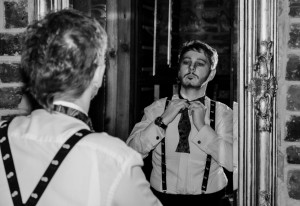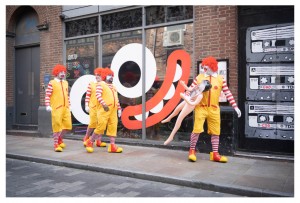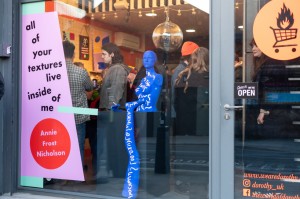“The vinegars are my characters. They’re the celebrities.”
A Conversation with Artist James Choucino
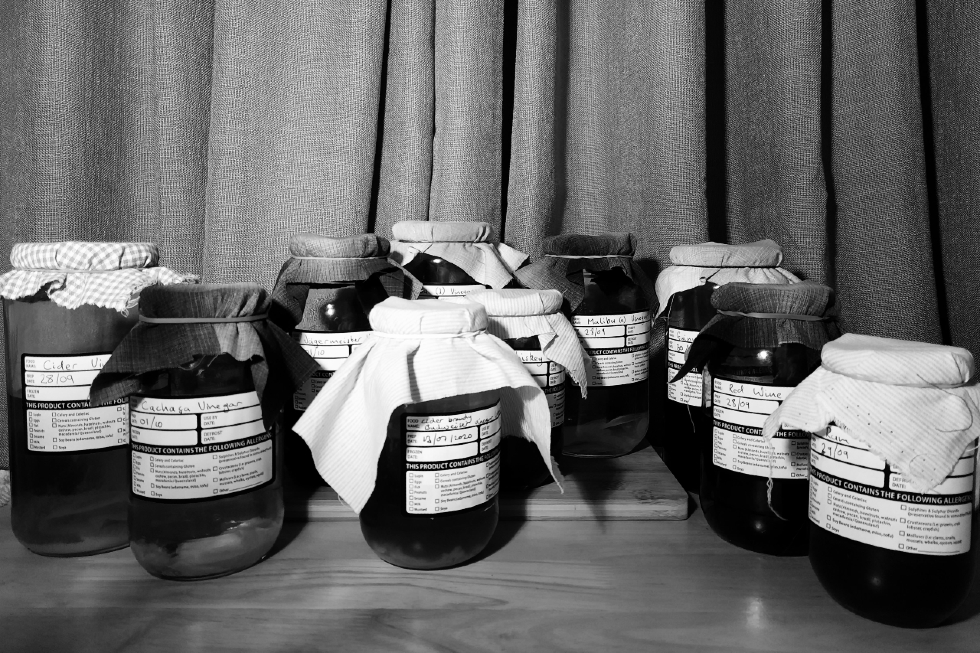
“I’m not really sure how to explain why I want to do this!” What does an artist residency look like during lockdown? We spoke with James Choucino, midway through his time on Abingdon Studios’ residency programme, Work/Leisure to find out…
“The vinegars are my characters. They’re the celebrities. It’s like Andy Warhol’s screentests in a way.” I’m speaking with James Choucino, an artist currently midway through Work/Leisure, a residency with Blackpool’s Abingdon Studios initiated to support artists to develop new work in response to the town. Over the phone we discuss – among other things – Blackpool’s status as a coastal town, its history as a place of entertainment and, unsurprisingly, the implications of lockdown on any artistic endeavour. About his motivations for applying to the residency in the first place, he said: “I’m quite interested in the coast; I like this idea of being on the edge of something. There’s something raw and brutal about [that]. It’s daunting in a way – the sea crashing against the rocks sort of thing.”
It’s refreshing to hear this quite romantic view of Blackpool, and of the north west in general, I offer. “There’s this contrast between two things – this neon-lit place of amusement and everyone having fun, and the sea, which is kind of aggressive and scary, but also quite beautiful” he qualifies. Living just down the way in Liverpool, this dichotomy observed with fresh eyes is one I’ve never previously pondered. Just prior to the nation’s being plunged into full Covid uncertainty Choucino, who had “never been to Blackpool before”, managed a four-day flying visit. “It’s a very interesting place – I can’t quite get my head around it… how it functions. I don’t think I’ve ever been to a town that is so built around entertainment.”
For the self-described outsider it’s understandable, especially given the brevity of his stay, and Blackpool’s very particular modus operandi. But any lack of getting a hold on what makes the seaside town tick wasn’t for want of trying. While there, he met with several of Abingdon Studios’ artists. “It was fantastic to sit down with such a varied cast of people. I was honoured to get [to speak to] all of these people, and I’m very thankful to them all and to Garth [Gratrix, Abingdon’s founder and co-director] for setting it all up. As an outsider coming in, it was quite amazing; very nice, and warming.” I file his use of the word ‘cast’ when describing his conversations at Abingdon for later and ask what his hopes are for the residency.
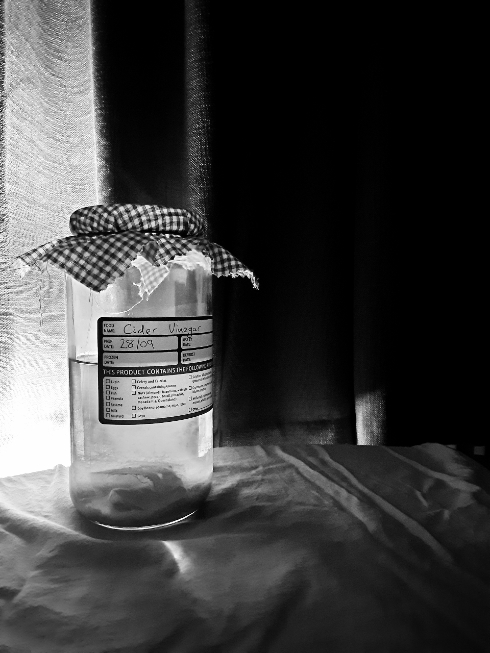
“I feel like I’m trying to cover a lot of things…” he says. “Obviously the residency is about work and leisure so it’s quite interesting to be in a town that’s all about leisure, but then there’s all the work that holds that up that can be quite overlooked.” I mention that in a conversation with Gratrix, he’d put it to me that “Blackpool is a hardworking place – the notion of leisure time is underpinned by work: Blackpool works hard so you don’t have to.” And Choucino acknowledges that he wants to reflect this in the artwork: “[Lockdown] has highlighted how different people’s jobs are viewed”, but “I don’t want it to be too on the nose.” Which, in a roundabout way, brings us back to those vinegars. His proposal when applying for the opportunity began with the compelling and disarming assertion ‘I would like to make vinegar’. He outlines that vinegar production begins with what is referred to by those in the know as a ‘vinegar Mother’; a term, he says, which ‘in relation to Work/Leisure conjures up a lot of ideas’.
Asking Choucino to expand on the work he’s developing, he describes two related strands that he’d like to unify in the form of a play. He begins by saying that: “Somehow lockdown was in the back of my mind when I wrote the proposal. The vinegar is there at home, working, transforming.” Meanwhile, what about those artist interviews, I wonder, the other strand – how did they inform his direction of travel? “I’m writing a play. I’ve done all these interviews with people, and they’ll be characters.” Then: “I interviewed nine people so there are nine jars of vinegar.” How do we tell them apart, I ask. “Vinegar’s made with alcohol, so I asked the people I interviewed to tell me what they wanted to be made out of. You have to use alcohol, so they all chose a different alcoholic beverage [from red wine, cider and Guinness to Jägermeister].” In addition to his ‘cast’, he says, “there’s a jar I was making a while ago, and that’s the narrator, which is kind of like me. That’s the mother vinegar which allows the other vinegars to take shape. Now I say that out loud, I’m not sure I like the sound of it!”
Writing is an aspect of Choucino’s work that really interests me. Doing a bit of research before our phonecall, I read his proposal, artist’s statement and find, among the images and film that populate the pages of his website, there are numerous texts – both poetry and prose. I ask about the role text plays in his work and how it will be, through the script for the play, central to his Work/Leisure outcomes. “Actually,” he begins, “I have a weird relationship with writing; I’m dyslexic. A lot of the rules that come with writing, I’m quite happy to ignore. There’s a lot of rules that are quite restrictive. It’s quite frustrating for me. Language is for communicating – it shouldn’t have to follow rules as long as it gets the message across. [English is] quite colonial, too. I feel like everything you write should be able to be spoken as a normal thing. I try to write how I speak. I think that’s why I want to write a play because it’s spoken not read. There’s a bit of a hierarchy. My enjoyment with writing comes from doing it as I want to do it. I think it works quite well.”
Naturally, this leads to the question of how – and when – any works will be presented. (Shortly after we speak it was announced that the country was heading for a further lockdown.) “At the moment, performing is an issue but I think I’m leaning towards that” comes the reply. Do you foresee this taking place in real life, I ask, or will it necessarily be a digitally streamed opening night? “I think at the moment these [the play and vinegars] will be presented online”, he says. While Choucino doesn’t know “if I’ll have it as text or a reading” both are possibilities and, as we face another month or more in lockdown, Zoom-ing into a performance about Blackpool by a cast of vinegars – while sounding outlandish – should prove a tonic.
Mike Pinnington
Images courtesy James Choucino
Abingdon Studios founded the Work/Leisure residency programme in 2016 to support artists with time, space and money to think through, test and or complete existing ideas in a way that firstly felt most useful to their development and secondly as a means for Abingdon to continue to understand how artists are working and how this might relate or react to a place unique as Blackpool.
Abingdon Studios, as part of its 2020 Emergency Response Fund packages of support, commissioned The Double Negative to highlight the work of the studio’s current Work/Leisure residency artists. With thanks to Arts Council England and guest selectors, curator Paulette Terry Brien, and artists Laura Jamieson and Emily Speed.



